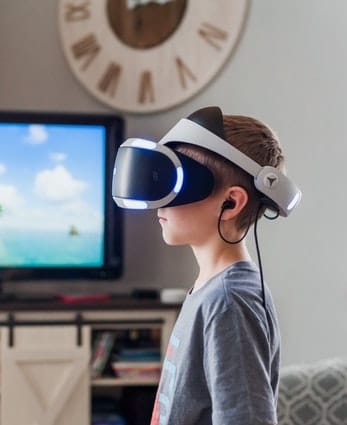Limit
Screen Time
Limit Screen Time
According to the American Academy of Pediatrics, too much screen time can increase the risk of attention problems, social and emotional health and difficulty sleeping in children.1 Excessive media use has also been associated with lags in achievement of knowledge and weight gain in children. Screen time is defined as TV viewing and recreational time on phones, tablets, gaming devices, and computers. In the U.S., most children spend about 3 hours a day watching TV and 5 to 7 hours combined on all types of screen time.

The first two years of life are critical periods of growth and development for children’s brains. To best develop their cognitive, language, motor, and social-emotional skills, infants and toddlers need hands-on exploration and social interaction with trusted caregivers. Real life interactions with caregivers is the best way to promote such skills.
Early care and education programs can support the best practice of limiting screen time by prioritizing physical activity and increased personal social interactions and engagement during the program day.
Limiting Screen Time ECE Best Practices
- Best practices outline no screen time for children ages 2 and younger.
- No more than 1 hour of high-quality programing screen time per day at school and at home for children aged 2 to 5 years.
- For children of all ages, digital media and devices should not be used during meal or snack time, or during nap/rest times and in bed.
- ECE providers are encouraged to communicate with parents/guardians about their guidelines for home media use.
1Media and Young Minds. (2016). Pediatrics, 138(5), e20162591. doi: 10.1542/peds.2016-2591
Resources
ABC’s of a Healthy Me Session Four: Watch session four of our FREE six-part online training, ABC’s of a Healthy Me. Session four reviews the screen time best practice areas for promoting a healthy weight in children 0 to 5 years old in the ECE setting. Complete all six sessions to earn 1 continuing education unit.
Healthy Kids, Healthy Future: Healthy Kids, Healthy Future is a nationwide call-to-action that empowers child care and early education providers to make positive health changes in children that could last a lifetime. On their website, you can find trainings and resources focused on reducing screen time.
Common Sense Media: Since 2003, Common Sense has been the leading source of entertainment and technology recommendations for families and schools. They offer the largest, most trusted library of independent age-based ratings and reviews. Visit their website for information and resources related to screen time for children.
Go NAPSACC: Go NAPSACC works with child care providers to improve the health of young children through practices, policies, and environments that instill habits supporting lifelong health and well-being. Visit their website to access flexible modules and resources focused on key topics like healthy eating, physical activity and oral health.








